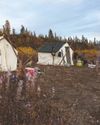Josephine Pelletier was shot to death by Calgary police in May. Her life and death shed light on the complicated interplay between colonialism, incarceration, and police brutality. This is her story.

Her name was Josephine Shelly Lynn Pelletier. She was Cree and Saulteaux, and she was 33 years old.
GROWING UP
Josephine – her friends called her Jojo – was born on February 25, 1985, in Regina, the third of five children. Her mother, Donna, struggled with drug addiction. She tells me over the phone that Josephine “barely knew” her father, a violent alcoholic who was in and out of jail for most of Josephine’s life. “She did struggle,” Donna says. “There was sexual assault. There was everything.”
Court records and Josephine’s testimony confirm a traumatic childhood. At a 2011 hearing where she was deemed a long-term offender – only the second woman in Saskatchewan to be declared as such – the court was told that Josephine was sexually abused by the brother of her stepfather, starting when she was three years old. He was never charged and the abuse continued until Josephine was 11.
Donna’s own childhood was filled with violence. “We were abused,” she says about the years between ages three and about 10, when she and her nine siblings were removed from their Regina home and sent to live with their grandparents on Muskowekwan reserve, outside of Regina, Saskatchewan. “It wasn’t until my older sister was 17 that she got us put back with our mom,” Donna recalls.
この記事は Briarpatch の January/February 2019 版に掲載されています。
7 日間の Magzter GOLD 無料トライアルを開始して、何千もの厳選されたプレミアム ストーリー、9,000 以上の雑誌や新聞にアクセスしてください。
すでに購読者です ? サインイン
この記事は Briarpatch の January/February 2019 版に掲載されています。
7 日間の Magzter GOLD 無料トライアルを開始して、何千もの厳選されたプレミアム ストーリー、9,000 以上の雑誌や新聞にアクセスしてください。
すでに購読者です? サインイン

PLATFORMS FOR PEOPLE, NOT PROFIT
Digital platforms boast that they’ve “democratized” cultural production. But what would truly democratic platforms look like in Canada?

ORGANIZING THROUGH LOSS IN THE HEART OF OIL COUNTRY
The story of climate justice organizing in Alberta, at the heart of the tarsands, is the story of a group of young activists learning what it means to lose, and keep on fighting

GROWING THE LABOUR MOVEMENT
How unions are using community gardens to engage members, nourish communities, and help strikers weather the picket line

A NEW ERA FOR OLD CROW
In the Yukon’s northernmost community, the Vuntut Gwitchin First Nation is reckoning with how to preserve their land and culture, amid a warming climate and an influx of tourists

“At Least Hookers Get Wages”
The risky business of sex work in the gig economy

The Literal – And Literary – Futures We Build
Briarpatch editor Saima Desai talks to two judges of our Writing in the Margins contest about Idle No More and MMIWG, ethical kinship, writing queer sex, and their forthcoming work.

The Cost Of A T-Shirt
In Honduras, women maquila workers are fighting back against the multinational garment companies that they say are endangering their health and safety.

Milking Prison Labour
Canada’s prison farms are being reopened. But when prisoners will be paid pennies a day, and the fruits of their labour will likely be exported for profit, there’s little to celebrate.

Bringing Back The Beat
In mainstream media, labour journalism has been replaced by financial reporting and business sections. But journalism students are raising the labour beat from the grave.

There's No Journalism On A Dead Planet
Corporate media owners are killing local newspapers – which is making it impossible for everyday people to understand the on-the-ground impacts of the climate crisis